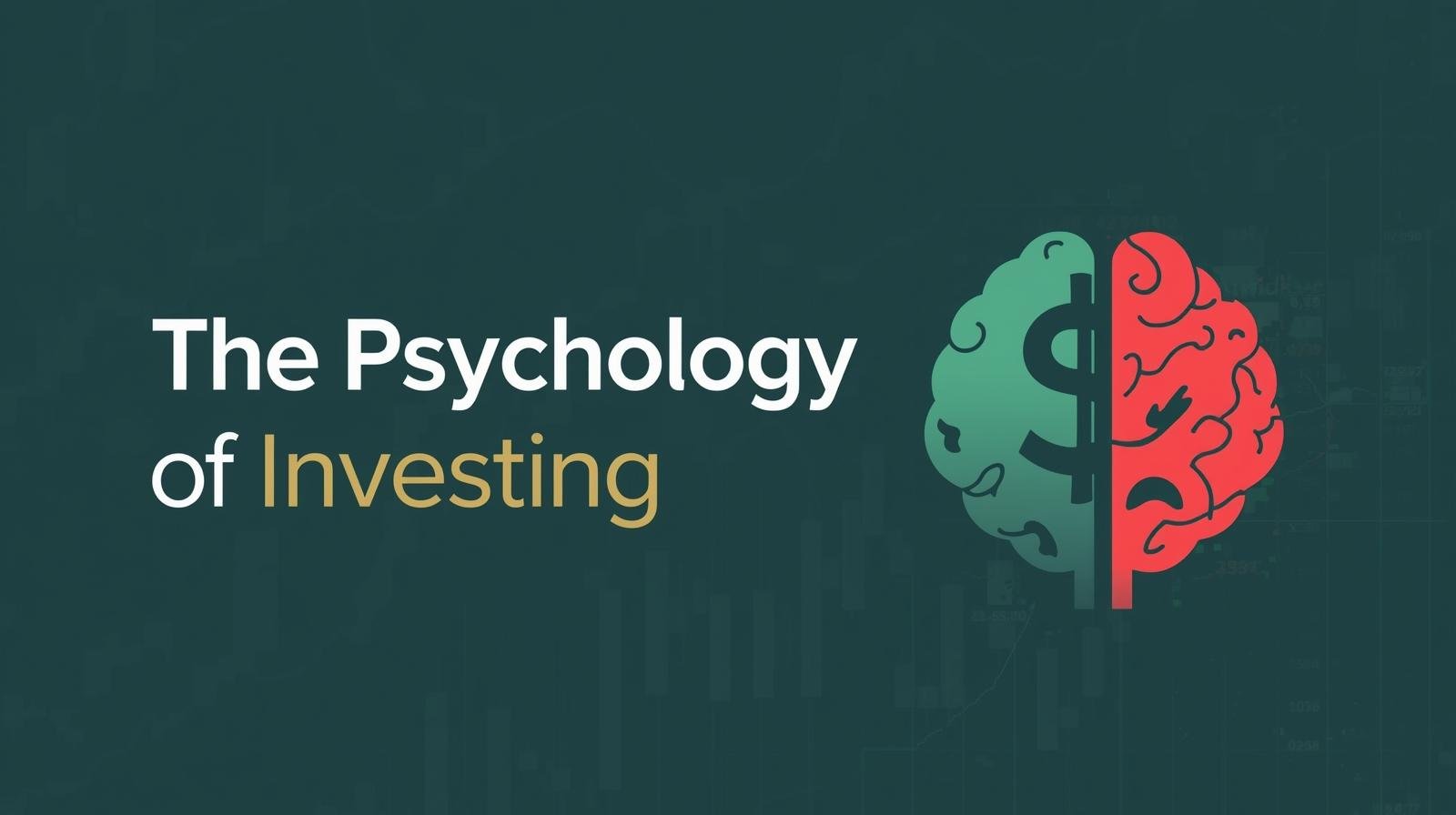hy Emotions, Not Markets, Are Your Biggest Investing Risk
In markets driven by numbers, charts, and algorithms, it’s easy to forget that behind every trade is a human being — and humans are emotional creatures. Whether it’s fear during a crash or euphoria during a rally, emotions often play a larger role in investment decisions than logic or data. Understanding this hidden driver — the psychology of investing — is one of the most valuable skills an investor can master.
In 2025, when markets swing wildly on headlines, AI hype, and shifting interest rates, the mental game matters more than ever. Those who can control their emotions and think independently often outperform those who can’t. Let’s explore why psychology shapes the markets, the most common emotional traps investors fall into, and how you can build the discipline to stay rational when everyone else is losing their cool.
The Human Side of Markets
Financial markets are not purely efficient machines — they are complex systems powered by human behavior. Every buy and sell order reflects a decision influenced by fear, greed, hope, and regret. When enough people act on similar emotions, markets move.
Behavioral finance, a field pioneered by psychologists Daniel Kahneman and Amos Tversky, proved that investors are not perfectly rational. We systematically make errors in judgment known as cognitive biases. These biases lead us to misprice risk, chase performance, and panic at the wrong moments.
Even professional investors, armed with models and PhDs, fall prey to psychological errors. The 2008 financial crisis and the 2021–2022 crypto bubble are not just economic stories — they are human stories about overconfidence, herd mentality, and denial.
Recognizing that markets are human is the first step toward mastering them.
The Fear–Greed Cycle
Markets move in cycles — and so do investor emotions. The two dominant forces, fear and greed, push prices far above or below their fair value. This emotional pendulum is responsible for bubbles, crashes, and the endless rotation between optimism and despair.
During bull markets, greed takes over. Investors believe “this time is different,” valuations stop mattering, and risky assets soar. In 2021, traders piled into meme stocks and crypto tokens believing they had found the path to instant wealth. The fear of missing out (FOMO) drives reckless buying.
During bear markets, fear dominates. Investors panic-sell, convinced prices will never recover. Media headlines amplify pessimism, and even solid companies trade at fire-sale prices. The fear of losing money makes investors sell exactly when they should be buying.
The irony is that greed in booms and fear in busts both lead to poor outcomes. Successful investors learn to do the opposite — to be fearful when others are greedy and greedy when others are fearful, as Warren Buffett famously said.
Common Behavioral Biases in Investing
Understanding your own biases is crucial to improving your decision-making. Let’s explore the most common ones that quietly sabotage portfolios.
Loss Aversion
People feel the pain of losses twice as strongly as they feel the pleasure of equivalent gains. This causes investors to hold on to losing stocks, hoping they’ll rebound, instead of cutting losses early. It also leads to selling winners too soon — locking small gains but missing long-term upside.
Confirmation Bias
Investors often seek information that confirms their existing beliefs and ignore evidence that contradicts them. A Bitcoin bull might only follow pro-crypto analysts, while a value investor might dismiss growth stocks out of habit. This echo chamber effect reinforces poor decisions.
Herd Behavior
Humans are social creatures — we tend to follow the crowd. When everyone is buying tech stocks or rushing into gold, it feels safer to join in. But herd mentality inflates bubbles and deepens crashes. Independent thinking is hard but essential.
Overconfidence Bias
Many investors believe they are smarter than average. Overconfidence leads to excessive trading, risky bets, and ignoring diversification. It’s why even seasoned traders blow up accounts — they underestimate uncertainty.
Recency Bias
We give more weight to recent events than to long-term averages. After a few months of rallying markets, investors assume it will last forever. After a crash, they assume it will never end. Recency bias blinds us to the cyclical nature of markets.
By learning to spot these biases in yourself, you gain an edge. Awareness is the first step toward control.
The Cost of Emotional Decisions
Emotion-driven decisions can be devastating to long-term returns. Studies consistently show that the average investor underperforms the very funds they invest in — not because the funds are bad, but because investors mistime their entries and exits.
For example, during the 2020–2022 period, many investors sold near pandemic lows out of panic and re-entered after prices recovered. The result? Missed gains and psychological exhaustion.
Emotions don’t just reduce returns; they destroy confidence. Once an investor loses trust in their own process, they’re more likely to chase “hot tips” or swing between extremes of risk-taking and avoidance. Over time, this erodes both wealth and mental stability.
How to Build Emotional Discipline
Have a Clear Plan
Define your investment goals, time horizon, and risk tolerance. When markets swing, your plan acts as an anchor. Without one, every headline feels like a reason to buy or sell. For guidance, see CFA Institute’s report on investor behavior.
Automate Decisions
Automation removes emotion from timing. Techniques like dollar-cost averaging invest fixed amounts at regular intervals, regardless of market mood. It’s simple but powerful.
Detach Ego from Market Outcomes
You are not your portfolio. Winning trades don’t make you a genius, and losing ones don’t make you a fool. Detaching ego helps you view performance objectively.
Limit Information Overload
Constantly checking prices or news amplifies anxiety. Instead, set structured review periods — monthly or quarterly — to assess your portfolio rationally.
Use Checklists
- Does this align with my long-term plan?
- Am I acting out of fear or greed?
- What evidence supports this decision?
This small pause helps interrupt emotional impulses.
Data and Process Over Emotion
The best investors rely on systems, not feelings. Data-driven frameworks make decisions repeatable and consistent. Diversification, rebalancing, and long-term metrics like earnings growth and cash flow matter more than daily price noise.
Legendary investors like Ray Dalio emphasize that success is about building rules and following them even when your instincts disagree. The process protects you from yourself.
It’s not about removing emotion entirely — that’s impossible — but about designing a process that minimizes its destructive power. Resources like Morningstar’s behavioral investing research are valuable reading.
The Role of Time Horizon
Time is the most powerful psychological tool in investing. The longer your horizon, the less emotional volatility matters.
Short-term traders live in constant tension, reacting to every fluctuation. Long-term investors, by contrast, understand that temporary losses are part of the journey. The stock market has always rewarded patience — but patience requires faith, discipline, and mental endurance.
Think of markets like the tide: waves crash in and out, but the ocean always moves forward. Those who learn to ride out the noise instead of fighting it are the ones who build wealth.
Tools to Master Investing Psychology
Investment Journal
Write down why you made each trade or investment. Later, review the results. You’ll start spotting emotional triggers, overconfidence moments, or fear-driven mistakes. Journaling transforms experience into insight.
Mindfulness and Mental Fitness
Practices like meditation, exercise, and even short breaks reduce stress and impulsivity. Calm minds make clearer financial decisions.
Education and Continuous Learning
The more you understand markets, the less mysterious they feel. Knowledge replaces fear. Reading investor letters, books like Thinking, Fast and Slow, or case studies sharpens your perspective.
Learn from the Masters
“The most important quality for an investor is temperament, not intellect.” – Warren Buffett
Mastering your emotions is the real alpha.
Conclusion: Master Your Mind, Master the Market
At its core, successful investing is less about predicting markets and more about managing yourself. The difference between good and great investors lies not in access to data but in emotional control.
Every market cycle tests human psychology — greed during booms, fear during busts. Those who learn to recognize these emotions, question their impulses, and act based on process rather than panic are the ones who last.
In a world of algorithmic trading and AI-powered forecasts, the human edge remains psychological discipline. As you build your investing journey, remember: rational investing is emotional mastery. Learn to stay calm when others panic, think independently, and stick to your plan — and the market will eventually reward your patience.
This article is for informational and educational purposes only. It does not constitute financial, investment, or legal advice.
All economic and financial policy discussions are presented for scenario analysis and illustration only. Investing involves high risk, and you may lose capital.
Always conduct your own independent research and consult a qualified professional before making any financial decisions.








